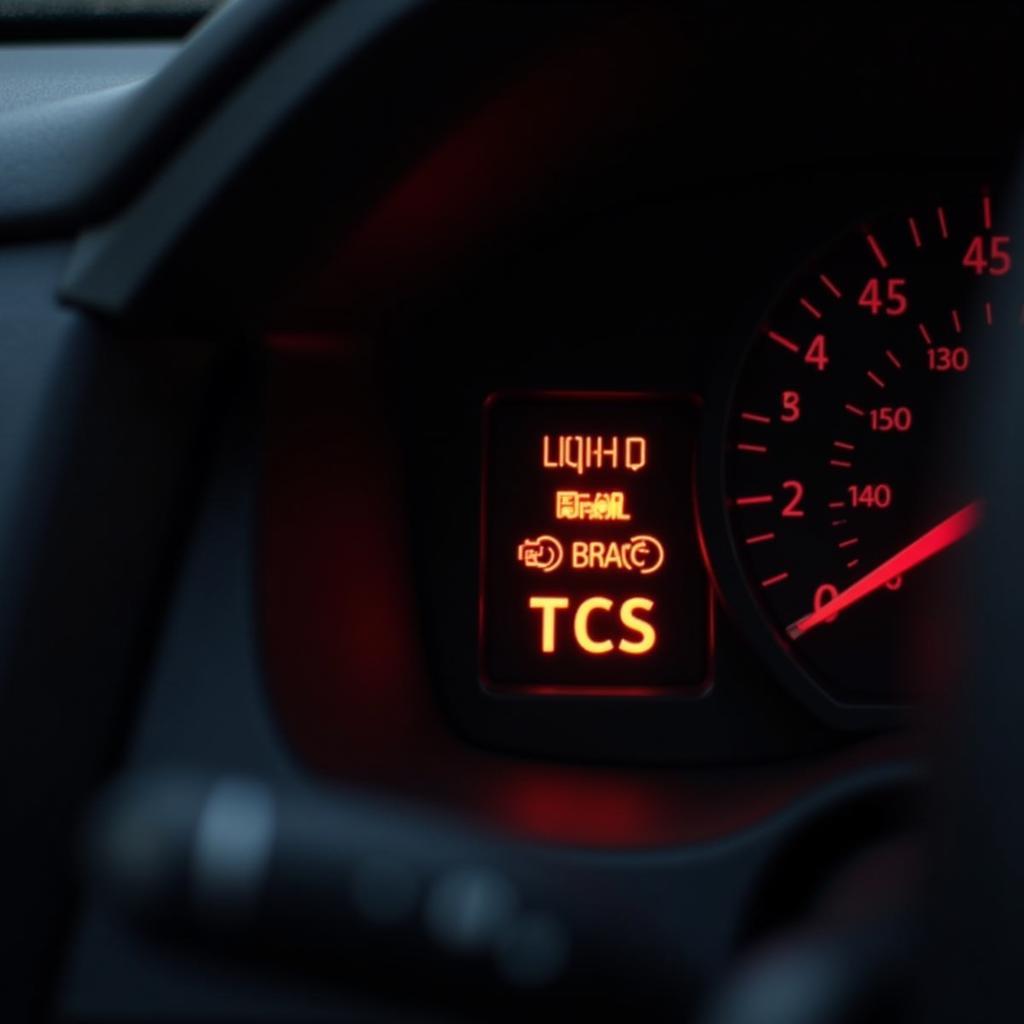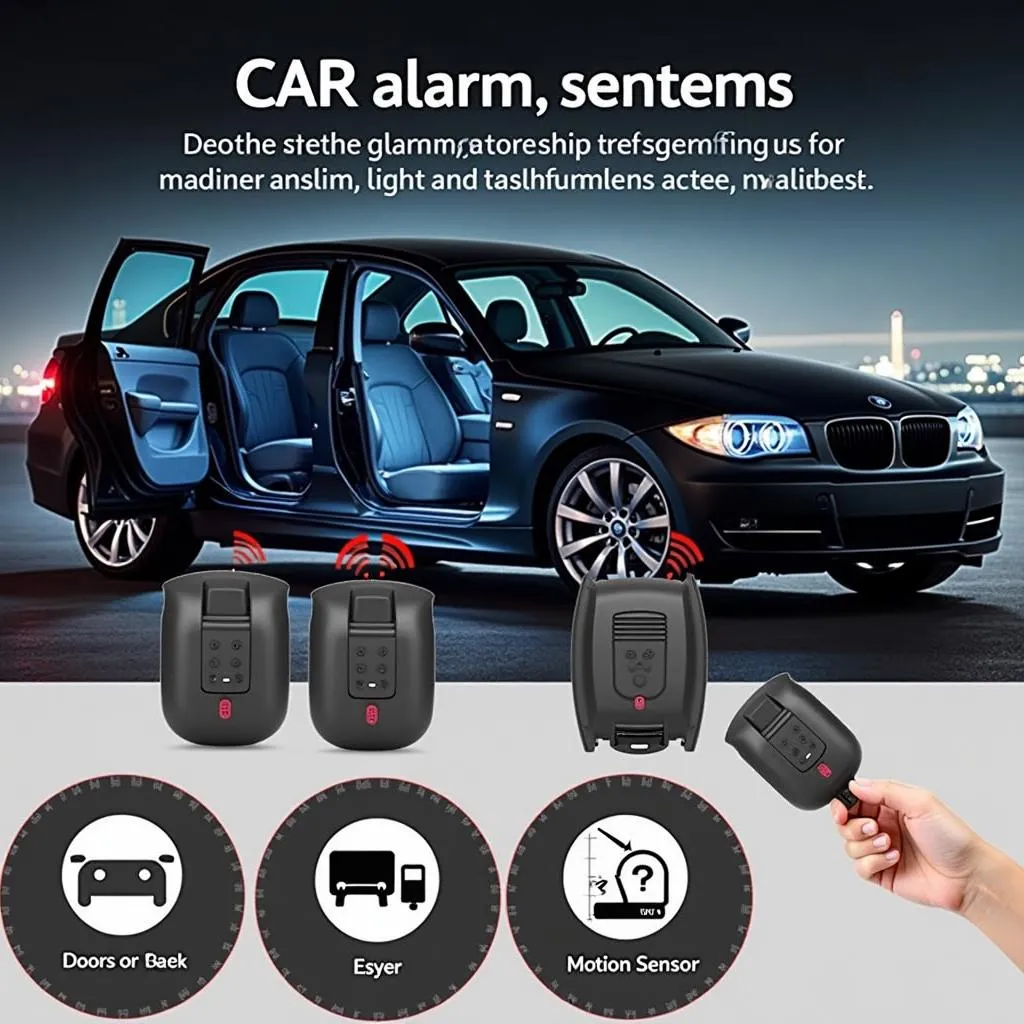Finding your Honda Accord’s brake warning light and TCS light illuminated simultaneously can be alarming. This usually signals an issue within your car’s braking or traction control systems, demanding immediate attention. While it might seem daunting, understanding the potential causes and solutions can help you address the problem effectively.
This comprehensive guide delves into the common reasons behind a lit brake warning light and TCS light in Honda Accords, provides potential solutions, and guides you on the next steps to take.
Common Causes of a Lit Brake Warning Light and TCS Light
Several factors can trigger both the brake warning light and TCS light in your Honda Accord. Here are some of the most frequent culprits:
-
Low Brake Fluid Level: A leading cause of these warning lights illuminating is low brake fluid. Your car needs a sufficient amount of brake fluid to function correctly. If the fluid level drops below a certain point, it could indicate a leak or worn-out brake pads.
-
Faulty ABS Wheel Speed Sensor: The ABS wheel speed sensor monitors the speed of each wheel and relays this information to the car’s computer. If a sensor malfunctions or gets covered in dirt or debris, it can disrupt the ABS and TCS systems, triggering the warning lights.
-
Worn-out Brake Pads: Brake pads have a finite lifespan. As you use your brakes, the pads gradually wear down. If they wear down too much, it can trigger the brake warning light and potentially affect the TCS system.
-
Faulty Brake Light Switch: The brake light switch activates your brake lights when you press the brake pedal. A malfunctioning switch can not only prevent your brake lights from working correctly but can also confuse the car’s computer, leading to illuminated warning lights.
-
Issues with the Traction Control System (TCS): The TCS helps prevent wheel spin and maintain traction on slippery surfaces. A malfunction within the TCS itself, such as a faulty module or sensor, can trigger its warning light and often affects the ABS system, leading to both lights appearing.
 Honda Accord Dashboard Warning Lights
Honda Accord Dashboard Warning Lights
Troubleshooting the Warning Lights
Before heading to a mechanic, there are a few checks you can do yourself:
-
Check the Brake Fluid Level: Locate the brake fluid reservoir under the hood. Check the fluid level against the minimum and maximum markings. If it’s low, carefully add the correct type of brake fluid, but avoid overfilling.
-
Inspect the Brake Lights: Have a friend press the brake pedal while you check if all brake lights are functioning correctly. If they are not, the brake light switch might be faulty.
-
Visually Inspect the Brake Pads: If you’re comfortable doing so, you can visually inspect your brake pads for wear and tear. Look for thin pads or signs of metal-on-metal contact.
When to Seek Professional Help
If your brake warning light and TCS light stay on after these checks, or if you’re uncomfortable performing them yourself, it’s crucial to seek professional help immediately.
Driving with illuminated warning lights, especially those related to braking, can be dangerous. A qualified mechanic can diagnose the problem accurately using specialized equipment and recommend the necessary repairs.
Remote Diagnostics and Programming: A Modern Solution
In today’s technologically advanced world, remote diagnostics and programming offer a convenient and efficient way to diagnose and resolve car issues, including those related to brake warning lights and TCS.
2014 honda accord abs brake traction steering warning lights issue
Services like CarDiagTech leverage cutting-edge technology to connect with your car remotely. Experienced technicians can then analyze your Honda Accord’s systems, identify the root cause of the problem, and often resolve software-related issues remotely, saving you time and potentially reducing repair costs.
“Remote diagnostics is transforming the way we approach car repairs,” says John Smith, Senior Automotive Engineer at CARDIAGTECH. “It allows us to provide quicker and more efficient service to our customers while giving them greater transparency and convenience.”
Preventing Future Issues
Prevention is always better than cure. Here are a few tips to prevent future issues with your Honda Accord’s brake warning light and TCS light:
-
Regular Maintenance: Adhere to your Honda Accord’s recommended maintenance schedule. This includes regular brake inspections, fluid flushes, and part replacements.
-
Quality Parts: When replacing brake components, always opt for high-quality parts from reputable manufacturers.
-
Pay Attention to Warning Signs: Never ignore any unusual noises, vibrations, or changes in your car’s braking performance. Address them promptly to prevent more serious issues down the line.
honda accord abs tcs brake light warning lights
Conclusion
Experiencing a lit brake warning light and TCS light in your Honda Accord can be concerning. However, by understanding the common causes, performing basic troubleshooting, and seeking professional help when necessary, you can address the issue effectively and keep your car running smoothly.
Remember, your safety is paramount. Don’t hesitate to consult a qualified mechanic if you encounter persistent or concerning warning lights.
FAQs
1. Can I drive my Honda Accord with the brake warning light and TCS light on?
It is not advisable to drive with any warning lights illuminated, especially those related to your car’s braking system. Doing so could compromise your safety and potentially lead to further damage.
2. How much does it cost to fix a brake warning light and TCS light issue?
The cost of repair varies widely depending on the underlying cause. A simple brake fluid top-up is inexpensive, while replacing a faulty ABS module can be costly.
3. Are brake warning light and TCS light issues common in Honda Accords?
While any car can experience these issues, Honda Accords generally have reliable braking and traction control systems. Regular maintenance can significantly reduce the likelihood of encountering such problems.
4. Can I reset the brake warning light and TCS light myself?
While it’s possible to reset warning lights temporarily, it’s not a solution. The lights will reappear if the underlying problem is not addressed.
5. How often should I check my Honda Accord’s brake fluid?
It’s a good practice to check your brake fluid level at least once a month and before long trips.

